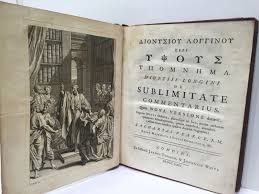|
The Sublime Style
 Longinus, who probably lived somewhere in the Roman Empire in the first century AD, was the first known thinker to analyze the concept of the sublime. Nothing is known about his life, and even the name “Longinus” is questionable. The passages below are adopted from his book THE SUBLIME. The book, written like a letter to a friend, explains that the sublime is produced only in language, in other words it appears in written or spoken speech (as opposed to modern thinkers who found the sublime also in nature, in art, and in people). A speech is sublime when it amazes the listeners and elevates their minds to a kind of ecstasy. This happens when it is higher than ordinary speech, but is also simple and direct, without pretensions, tricks, and childishness. Longinus, who probably lived somewhere in the Roman Empire in the first century AD, was the first known thinker to analyze the concept of the sublime. Nothing is known about his life, and even the name “Longinus” is questionable. The passages below are adopted from his book THE SUBLIME. The book, written like a letter to a friend, explains that the sublime is produced only in language, in other words it appears in written or spoken speech (as opposed to modern thinkers who found the sublime also in nature, in art, and in people). A speech is sublime when it amazes the listeners and elevates their minds to a kind of ecstasy. This happens when it is higher than ordinary speech, but is also simple and direct, without pretensions, tricks, and childishness.
A great mind is required to recognize and produce the sublime. Thus, sublime speech comes out a person of a great mind or spirit. Therefore, if we seek the sublime we must cultivate the greatness of our mind.
CHAPTER I
Sublimity is always an eminence and excellence in language. And from this, and only this, the greatest poets and prose-writers have achieved the first place, and have clothed their fame with immortality.
Because speeches of extraordinary genius lead the hearer not to persuasion but to ecstasy. The marvelous, with its power to amaze, is always necessarily stronger than the attempt to persuade and to please. To be persuaded usually depends upon us the hearers, while genius has a force that is irresistible by any hearer, and it stands high above him. One’s creative skill, and power of organization, are seen not in one or two passages, but emerge out of the whole context. As we know, when sublimity appears at the right moment, it parts all the matter this way and that way, and like a flash of lightning it reveals the power of the orator, at a stroke and in its entirety.
CHAPTER VII
As in our ordinary life, nothing is great if a great person would despise it. Thus, wealth, status, honor, kingdoms, and similar things that are often praised so arrogantly, could never appear to be a superior good, at least to a sensible person, since it is a good thing to feel contempt for them. Certainly, many people admire these things – especially those who hope to have them more than those who actually have them, but a great soul would let them go. This is also the case with things that are elevated in writings of poetry and prose. When something appears to have the greatness to which people attach so much careless praise, we have to ask ourselves whether, upon a careful examination, this apparent greatness could turn out to be vain and hollow, and something which it is nobler to despise than to admire. Because it is a fact of nature that the soul is raised by true sublimity, that it gains a proud step upwards, it is filled with joy and exultation, as though it had produced by itself what it hears.

Therefore, whenever a person of reason and literary experience hears something that does not turn his mind to high thoughts, and that does not leave in his mind material for fresh reflection beyond what is actually said, and if the effect disappears when he looks carefully at the whole context, this can never be true sublimity, because its effect remains only as long as it is heard. What is really great gives much food for fresh reflection, which it is hard to resist, even impossible, and it creates a strong and permanent memory. You can be sure that the beautiful and genuine effects of sublimity please always, and please everybody. Because when people of different habits, lives, ambitions, ages, all have the same view about the same writings, the judgement of such different individuals gives a powerful testimony for what they admire, beyond all dispute.
CHAPTER IX
Great natural genius [=talent] is more important than any other element [of sublimity]. Therefore, even if this genius is a gift rather than something we acquire, yet as much as possible we must nurture our souls to everything that is great, and make them full of noble gifts. You might ask: How? I myself have written in another place: “Sublimity is the sound which comes out of a great mind.” This is how an idea, without any speech, unclothed and unsupported [by any literary style], often inspires our wonder, because the thought itself is great: The silence of Ajax in the Book of the Underworld is great and more sublime than any words.
First, then, it is necessary to acknowledge the source from which sublimity comes: The true orator must not have a low mean spirit, because it is not possible that somebody who thinks small thoughts, and practices them all his daily life, could express anything that deserves wonder and immortality. Great words – and it cannot be otherwise – come from those minds that have significant thoughts. On the lips of persons of the highest spirit, words of rare greatness are found.
|


 Friedrich Schiller (1759-1805) was a major German playwright, as well as a poet and a philosopher. At an early age he started writing theatrical plays, and eventually became one of the most important German playwrights of modern times. As a young man he studied medicine and became a military doctor in Stuttgart, but did not like this position and escaped to Weimar. He became a professor of philosophy and history at nearby Jena. Together with Goethe, he founded the influential Weimer Theater. He died at the age of 45 from tuberculosis.
Friedrich Schiller (1759-1805) was a major German playwright, as well as a poet and a philosopher. At an early age he started writing theatrical plays, and eventually became one of the most important German playwrights of modern times. As a young man he studied medicine and became a military doctor in Stuttgart, but did not like this position and escaped to Weimar. He became a professor of philosophy and history at nearby Jena. Together with Goethe, he founded the influential Weimer Theater. He died at the age of 45 from tuberculosis.
 Longinus, who probably lived somewhere in the Roman Empire in the first century AD, was the first known thinker to analyze the concept of the sublime. Nothing is known about his life, and even the name “Longinus” is questionable. The passages below are adopted from his book THE SUBLIME. The book, written like a letter to a friend, explains that the sublime is produced only in language, in other words it appears in written or spoken speech (as opposed to modern thinkers who found the sublime also in nature, in art, and in people). A speech is sublime when it amazes the listeners and elevates their minds to a kind of ecstasy. This happens when it is higher than ordinary speech, but is also simple and direct, without pretensions, tricks, and childishness.
Longinus, who probably lived somewhere in the Roman Empire in the first century AD, was the first known thinker to analyze the concept of the sublime. Nothing is known about his life, and even the name “Longinus” is questionable. The passages below are adopted from his book THE SUBLIME. The book, written like a letter to a friend, explains that the sublime is produced only in language, in other words it appears in written or spoken speech (as opposed to modern thinkers who found the sublime also in nature, in art, and in people). A speech is sublime when it amazes the listeners and elevates their minds to a kind of ecstasy. This happens when it is higher than ordinary speech, but is also simple and direct, without pretensions, tricks, and childishness.
 Edmund Burke (1729–1797) was a British philosopher and politician. He grew up in Dublin, Ireland, which was then part of Britain, and after college education moved to London. He worked in several positions while writing and publishing several philosophy books. In his mid-thirties he entered a political career, was elected to the British House of Commons, and remained there for almost 30 years. As a good speaker he gave many speeches, many of which he later published. He died at the age of 68 after severe stomach problems.
Edmund Burke (1729–1797) was a British philosopher and politician. He grew up in Dublin, Ireland, which was then part of Britain, and after college education moved to London. He worked in several positions while writing and publishing several philosophy books. In his mid-thirties he entered a political career, was elected to the British House of Commons, and remained there for almost 30 years. As a good speaker he gave many speeches, many of which he later published. He died at the age of 68 after severe stomach problems.